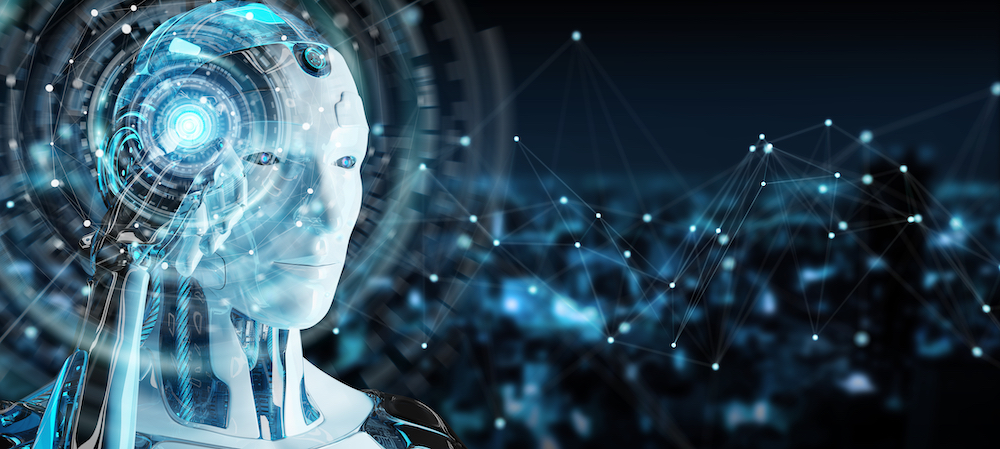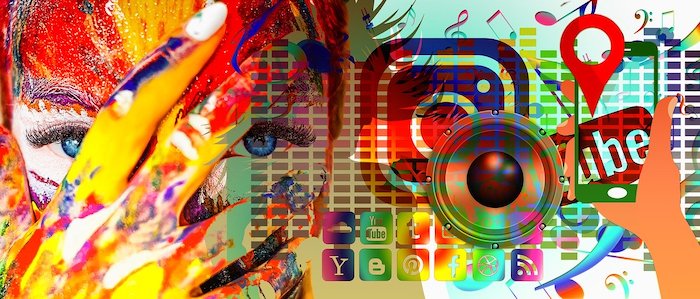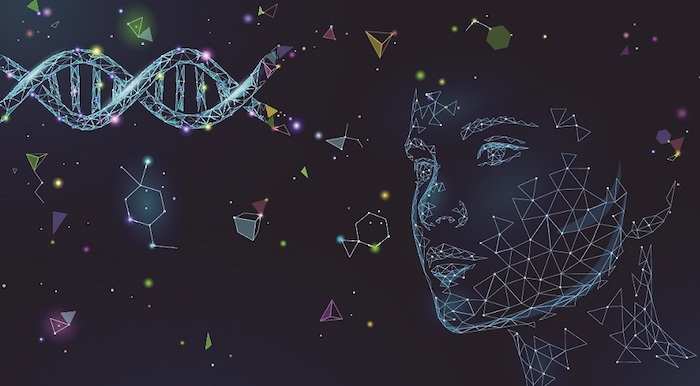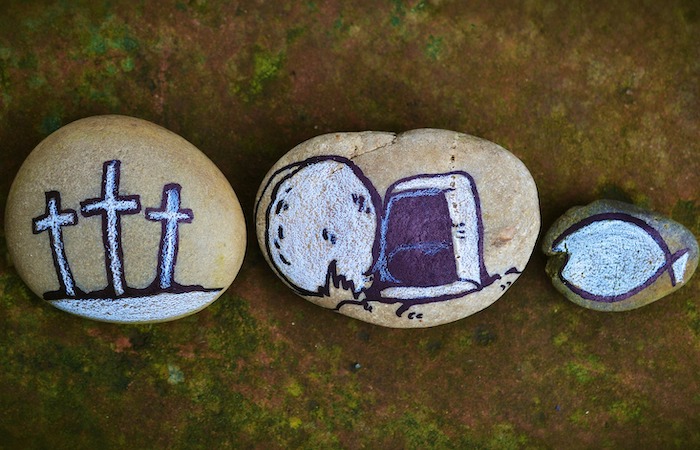
Shutterstock
This is not an issue we have to be swept along by… Whether you are excited or intimidated by recent developments, inspired or horrified by the potential, you can take part in the conversation.
(Year B, Sunday 9th June)
To get these posts before the lectionary reading comes up, you can subscribe (£5/month pls VAT) on Patreon.
Video Summary
Summary
Artificial Intelligence gives huge datasets to computers and teaches them to – in a sense – learn for themselves. This is a gamechanger, not just for doing good, but it can also cause great harm. We are already seeing the impacts of AI on medicine, warfare, videomaking and social media. Technology can offer solutions to the problems we face today, but cannot change the human heart. Many Churches are responding to the opportunities and challenges of AI at a denominational level, but there are also things individual churches can do. We can all have a voice in the conversation about this revolutionary technology.

Shutterstock
Discussion questions
- How does AI affect your life today?
- How do you think AI might affect your life in future?
- Are you excited about the potential of AI to help people’s lives improve?
- Are you worried about any potential negative impacts of impact of AI?
- What next step can you take to learn more about AI or influence its effects on your life or the lives of people around you?
Genesis 3:8-15 (NRSV)
They heard the sound of the Lord God walking in the garden at the time of the evening breeze, and the man and his wife hid themselves from the presence of the Lord God among the trees of the garden. But the Lord God called to the man and said to him, “Where are you?” He said, “I heard the sound of you in the garden, and I was afraid, because I was naked, and I hid myself.” He said, “Who told you that you were naked? Have you eaten from the tree of which I commanded you not to eat?” The man said, “The woman whom you gave to be with me, she gave me fruit from the tree, and I ate.” Then the Lord God said to the woman, “What is this that you have done?” The woman said, “The serpent tricked me, and I ate.” The Lord God said to the serpent, “Because you have done this, cursed are you among all animals and among all wild creatures; upon your belly you shall go, and dust you shall eat all the days of your life. I will put enmity between you and the woman and between your offspring and hers; he will strike your head, and you will strike his heel.”
2 Corinthians 4:13 – 5:1 (NRSV)
But just as we have the same spirit of faith that is in accordance with scripture—“I believed, and so I spoke”—we also believe, and therefore we also speak, because we know that the one who raised Jesus will also raise us with Jesus and will present us with you in his presence. Indeed, everything is for your sake, so that grace, when it has extended to more and more people, may increase thanksgiving, to the glory of God. So we do not lose heart. Even though our outer nature is wasting away, our inner nature is being renewed day by day. For our slight, momentary affliction is producing for us an eternal weight of glory beyond all measure, because we look not at what can be seen but at what cannot be seen, for what can be seen is temporary, but what cannot be seen is eternal. For we know that, if the earthly tent we live in is destroyed, we have a building from God, a house not made with hands, eternal in the heavens.
Article

© R Bancewicz
‘Where are you?’ The Lord God walks in the garden in the cool of the evening. Where are all the people: the species he commissioned to govern as he would – gently, wisely, creatively?
I’m writing this overlooking a line of trees and the living roof of the nearby Maxwell Centre at Cambridge University. The West campus is home to science and tech institutes, leafy and inspiring, with carefully designed spaces to meet or study. I decided to explore with a friend and we spent the morning in a quiet café, our work fuelled by subsidised tea and cake. After dropping into a lunch time seminar in the William Gates Building, we are now ensconced in a ‘contemplation room’ furnished in pale green.
The ivory tower fosters creative communities and deep thinking. Innovation happens when people are released and resourced to pursue their interests. Perhaps this is a sort of Eden where people can be their best selves, thoughtfully creating for good. Is that conversation in the evening breeze a little nearer in this idyllic-seeming place?
The seminar we attended was on how Artificial Intelligence is driving advances in genomics, which of course has the potential to improve healthcare. Many Christians see AI as one of the tools we can use to fulfil our calling to tend and keep both the human and non-human parts of creation.
‘I heard the sound of you in the garden, and I was afraid…I hid.’ AI has also presented us with new forms of temptation, opening the door to manipulation, exploitation and addiction. Today’s fugitives might say, ‘I spent all morning scrolling through social media’, ‘I fell for a fake news story and made my friends anxious by sharing it with them’, or ‘I felt lonely, so I watched some porn.’
The AI revolution isn’t just giving us another tool that can be used to help or harm. A hammer is simple enough to be a relatively neutral technology: you can use it to create something useful or to hurt someone. But smart devices can be designed to benefit the manufacturer without us realising. Setting up a laptop these days involves responding to a myriad of questions about sending data back to the developer so they can design products that may sell faster next time. Software (especially social media and games) is often intended to make us happy, but in a short-term way that keeps us clicking and spending. User interfaces are designed to appeal to all our emotions, selling more product for the company. Am I playing the same blame game that Adam and Eve initiated in the Genesis story, or are these potentially harms a new normal that we need to mitigate against?

Pixabay Gerd Altmann
In their biblically-focussed article Designed for Joy? Jennifer George and Rachel Siow Robertson wrote that tech companies tend to focus on fostering happiness in the user, but ‘there is…a need to distinguish between pleasures which benefit or hinder wellbeing.’ They draw attention to the type of joy that comes from ‘deep pleasure which arises when things are going well within us and between us, the world, and others.’ This is what we were made for: to follow the ‘very good’ (Genesis 1:31) arrangements of the Creator by ‘relating rightly to his words, works, and people.’
Pursuing good relationships may well become more challenging in the coming years. AI isn’t just a clever tool. Its power lies in its use of huge datasets to train software, and to let the computer learn for itself – in a sense. Because computers have such incredible processing power they can come up with new solutions far more rapidly than humans. For example, Alpha Go was an AI that learned to play the famously complex Korean game Go, beating the champion player Lee Sedol with a surprising move.

Shutterstock
Transhumanists offer hope in the form of highly enhanced human intelligence, by integrating computers with our brains, and eternal life through replacement bodies. For them, we are our own saviours. But technologically enabled eternal life would be a misery without enhancement of our values and our ability to live them out. Just as the industrial revolution produced new ways to cause harm, the AI revolution has already enabled a huge leap forward, or rather backwards, in our ability to inflict pain on each other. Lethal autonomous weapons and deepfake videos bring new cruelties within relatively easy reach.
Over the next few years more powerful AIs will be developed and governments will legislate to put new and improved legislative guardrails around their use. Many sections of the Church are developing theological thinking around this issue and finding ways to have a voice in the public forum. There are also smaller scale ways in which we can actively take part. Who in your church can help people understand AI and how to add guardrails to their own use of this technology? Who is involved in the tech sector and needs support as they use their creative talents to build or respond to AI in positive ways? Who is involved in teaching and supporting the young people whose worlds revolve so much around technology? This is not an issue we have to be swept along by. Each of us has purchasing power, a choice about how we use our devices, and decisions to make about whether we contribute our own information to the dataset that informs the development of AI. Whether you are excited or intimidated by recent developments, inspired or horrified by the potential, you can take part in the conversation.

Pixabay congerdesign
‘He will strike your head, and you will strike his heel.’ The Genesis story offers hope through the offspring of the man and the woman. Christians interpret this verse as a reference to Christ who, through his death and resurrection, defeated the enemy that tempts us. He gives anyone who chooses to follow him freedom from the power of sin and death. Christian faith offers a way to be more than we are, including a renewal of our minds. ‘We do not lose heart’, wrote Paul in his letter to the Corinthians, because ‘our inner nature is being renewed day by day’ (2 Cor 4: 13-5:1).
This a sample of our series of monthly Biblical resources for churches. Join for free on Patreon for access to each month’s set of material, addressing a different topic/Bible passage each month AND two podcasts with experts on the same topic.
If you would like to support this work financially (£6/month) you will also receive these benefits:
- access to two live podcast recordings each month, where you can ask questions of experts in the topics covered and meet like-minded people.
Further resources
Resources on AI from the Faraday Institute
Designed for joy? Reflections on the creation and use of digital technology, by Jennifer George and Rachel Siow Robertson
The Quest for Human-Level AI and its Implications for Theological Anthropology by Marius Dorobantu (recent Faraday seminar)




